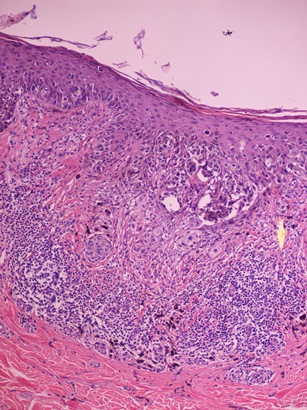New research finds biomarkers linked to melanoma patient survival
An international research collaboration led by University College Dublin (UCD), involving the UCD spin-out company OncoMark and Bellvitge Biomedical Research Institute in Barcelona, has identified a set of biomarkers strongly linked with survival in patients with melanoma that may help clinicians with treatment decisions. The study has also identified several biomarkers of tumour development and progression that have never been linked to cutaneous melanoma until now.
Cutaneous melanoma is the most life-threatening form of skin cancer with rising incidence and mortality rates particularly in men over 55 years and women of all ages. Currently, there are very limited tools available to help clinicians pinpoint the stage of the disease in a patient at the time of diagnosis. Clinicians make their diagnosis based on classical identifiers such as the thickness of the tumour.
Up until now, it has been problematic to identify early events during the development and progression of melanoma as studies used samples from tumour metastases rather than the primary tumour. This study involved a comprehensive mapping of the extent of DNA methylation occurring at three distinct stages of development of this skin cancer; from benign nevi to malignant melanoma to metastatic melanoma.
DNA methylation is a natural chemical change that results in genes being switched on or off. This epigenetic change does not alter the genetic code itself but affects how genes are read by cells and what proteins are made as a result.
The team have shown the importance of epigenomic regulation in triggering tumour spread by the way in which it can switch off certain cancer-related pathways and interrupt normal cell processes such as cell adhesion. When this occurs, tumour cells can break away from each other and metastasise or travel away from the original location to other parts of the body.
 Histologic image of melanoma nests invading the epidermis and the dermis, surrounded by a dense inflammatory infiltrate (yellow arrow pointing at the inflammation).
Histologic image of melanoma nests invading the epidermis and the dermis, surrounded by a dense inflammatory infiltrate (yellow arrow pointing at the inflammation).
Describing the significance of this study, Professor William Gallagher, UCD Professor of Cancer Biology at the UCD Conway Institute and Chief Scientific Officer at OncoMark said, “This research highlights that this type of comprehensive, genome-wide DNA methylation mapping can provide insight to the transformation and aggressiveness of tumour cells. It has allowed us to identify a DNA methylation signature associated with patient survival and we are excited by the potential clinical utility of these biomarkers. They may provide clinicians with a powerful tool to stratify patients who have benign versus more aggressive tumour types and allow them to tailor treatment accordingly.”
According to Dr Manel Esteller (Bellvitge Biomedical Research Institute, Barcelona), co-lead author on the study, “This study represents the most comprehensive epigenomic profiling assessment of well-described human melanomas. It verifies that DNA methylation biomarkers represent a valuable tool to identify potential protein biomarkers. This not only has implications for the clinical management of melanoma but several cancer types.”
Dr Jasper Wouters, first author of the study and postdoctoral fellow in KU Leuven, says, “In this epigenomic melanoma study, we establish novel biomarkers to identify patients with good prognosis that do not necessarily need to undergo aggressive and expensive therapies. Importantly, some of these biomarkers can potentially be assessed non-invasively, using cell-free DNA in the serum of patients.”
The study is published in the journal BMC Medicine and available online at https://bmcmedicine.biomedcentral.com/.
Journal reference: Wouters et al. Comprehensive DNA methylation study identifies novel progression-related and prognostic markers for cutaneous melanoma. BMC Medicine DOI: 10.1186/s12916-017-0851-3
In The Media
RTE
Medical Xpress
Social Media Links